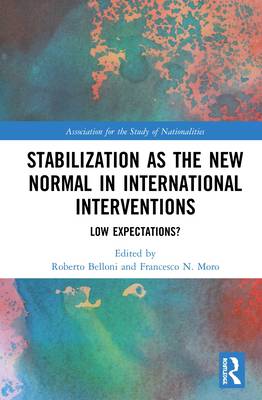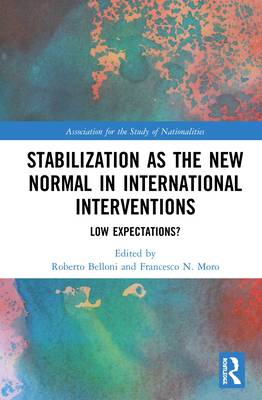
- Retrait gratuit dans votre magasin Club
- 7.000.000 titres dans notre catalogue
- Payer en toute sécurité
- Toujours un magasin près de chez vous
- Retrait gratuit dans votre magasin Club
- 7.000.0000 titres dans notre catalogue
- Payer en toute sécurité
- Toujours un magasin près de chez vous
Stabilization as the New Normal in International Interventions
Low Expectations?
Description
Stabilization as the New Normal in International Interventions provides the first comprehensive analysis of stabilization, which constitutes the new reference point for international intervention in unruly parts of the Global South.
The notion of 'stabilization' and the practice of 'stability operations' experienced a revival over the last decade. The United Nations, the European Union, NATO, as well as most member states of the Organisation for Economic Cooperation and Development have embraced these terms in their foreign policy bureaucracies. The general disillusionment with the achievements of large-scale peacebuilding operations in countries like Afghanistan and Iraq, as well as the failures of the so-called Arab Springs, contributed to the success of this new discourse. Yet, while widely mentioned and endorsed, stabilization is rarely defined. This volume identifies common elements to stabilization doctrines and examines how they are applied in practice. It dissects how stabilization emerged and unfolds, how different actors adopt it and for what purposes, and how it is linked to the broader security and development discourses.
Stabilization as the New Normal in International Interventions will be of great interest to scholars of Peacebuilding, International Intervention and International Relations more generally. The chapters were originally published as a special issue of Ethnopolitics.
Spécifications
Parties prenantes
- Editeur:
Contenu
- Nombre de pages :
- 122
- Langue:
- Anglais
- Collection :
Caractéristiques
- EAN:
- 9780367856571
- Date de parution :
- 25-02-20
- Format:
- Livre relié
- Format numérique:
- Genaaid
- Dimensions :
- 175 mm x 246 mm
- Poids :
- 452 g






